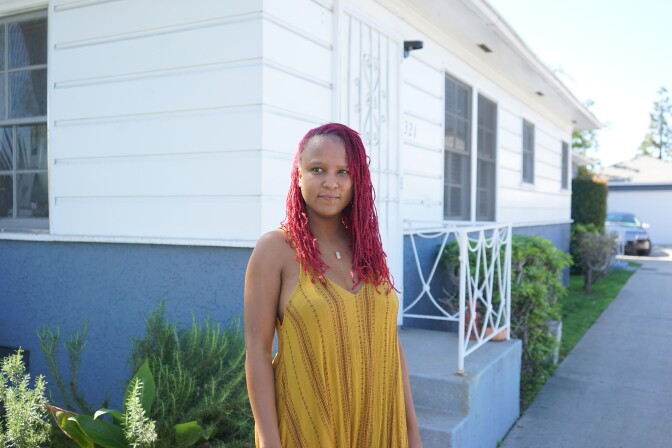Tahira Ali supports people as they navigate the joys and trials of pregnancy — from giving birth to postpartum, and everything in between.
She’s also helped pregnant patients work through domestic violence, homelessness and poverty. It's exactly the type of work she wanted to do when she trained to become a doula, a person who helps parents through childbirth.
So when California's health insurance for low income people expanded to include doula services in 2023, she enrolled. But now Ali says she's owed thousands of dollars for services she's provided to Medi-Cal patients due to unpaid reimbursement claims.
She's not alone. Two years after Medi-Cal started covering doula care, a number of those workers say it's a constant fight to get reimbursed for their services. Others say they haven't been paid for some work at all.
"Medi-Cal is the worst thing I've ever done in my life," Ali said. " I'm doing my Medi-Cal clients essentially for free, because I don't get paid. When I do get paid, it's like months and months and months and months after I've done the visit."
And the experience also raises concerns that doulas will stop taking Medi-Cal patients altogether.
Doulas demand changes to Medi-Cal program
Doulas and groups representing them sent a letter to California's Department of Health Care Services on Monday claiming they are experiencing denied and delayed repayment claims, and need more clarity and support from Medi-Cal managed care plans to navigate billing.
"These compliance issues are exacerbating distrust among the doula workforce, which severely diminishes the willingness of doulas to participate in the Medi-Cal Doula Benefit," the letter states.
Their concern isn't just for doulas — it's for the Medi-Cal program's future, especially if providers pull out. The benefit was added in part to help address racial disparities in pregnancy outcomes for Black and Brown mothers and to provide continuous support to pregnant people that would otherwise be financially impossible.
What doulas do
Doulas are not doctors or midwives. They don't deliver babies and they do not make medical decisions on a client's behalf or tell them what to do. Think of them more like coaches or advocates for pregnant people and their partners as they approach their due date, while they're giving birth, during the postpartum phase. Doulas also support people through miscarriage, stillbirth, or abortion.
Have more questions? We've written a whole guide about doulas. Lea la guía en español.
"If we don't have enough workforce, we don't have enough doulas to supply the benefit, then those families are not getting the reproductive care that they deserve, and that is their right," said Khefri Riley, the director of community organization Frontline Doulas and a director for L.A. County's Medi-Cal Doula Hub. "That's what I'm concerned about."
Frontline Doulas is one of the community groups signed onto the DHCS letter, which also says that some doulas still are waiting to be paid new, higher rates for their services after California boosted doula pay in 2024.
LAist gave DHCS three business days to respond to a request for comment; a spokesperson said they needed more time to get answers. This story will be updated with a response if it comes in.
LAist also reached out to Medi-Cal managed care plans L.A. Care, HealthNet, Molina Healthcare and Kaiser Permanente. Only Kaiser Permanente responded in time for publication.
"Kaiser Permanente is committed to providing prompt, accurate reimbursement to the doulas who support our Medi-Cal members," a spokesperson said in a statement. "We are in compliance with Targeted Rate Increase fee schedule rates for doula providers as required by DHCS."
Why are doulas facing delays with re-payment?
State guidance says that managed care plans should pay claims within 30 days, and owe interest if they don't pay within 45 business days. But some doulas told LAist they consistently had their claims denied, leading to long waits for repayment.
" I am not an expert in medical billing or insurance, so I don't know how it's supposed to work. This is what's been a little bit hard for doulas," said Michelle Brenhaug, a doula in the San Gabriel Valley who estimates she's been paid for less than 10% of the Medi-Cal services she's provided since June. " A lot of doulas are not super well off or super privileged that they can wait 3, 4, 5, 6 months to be paid."

According to the letter sent to the Department of Health Care Services, doulas have struggled to get help from Medi-Cal plans when submitting claims, and have also hit roadblocks with billing codes and other parts of the Medi-Cal bureaucracy.
Amy Chen, who leads the National Health Law Program’s Doula Medicaid Project, said that these problems are similar to other states that have implemented Medicaid coverage for doula care. Part of the challenge, she said, is integrating a new type of care into the healthcare system.
"The work is not medical, it's not clinical, and so I think that has also been something that has been challenging both for state Medicaid agencies and also for health plans and even for hospitals to kind of wrap their minds around," Chen said.
Medi-Cal doula benefit is part of a historic effort
Doulas say the reimbursement challenges will have to improve to keep the Medi-Cal program working and expanding. Forty percent of births in the state are funded through California’s Medicaid program, but as of last year only a tiny number of Medi-Cal members had accessed doula services and more doulas were needed to meet the need.
Tahira Ali, the doula in South L.A., is still accepting Medi-Cal patients, but says it's a struggle to pay her rent and afford her life.
" This work is very much heart-centered, emotional work," Ali said. "We don't do it for the money, but we do need to be paid."












